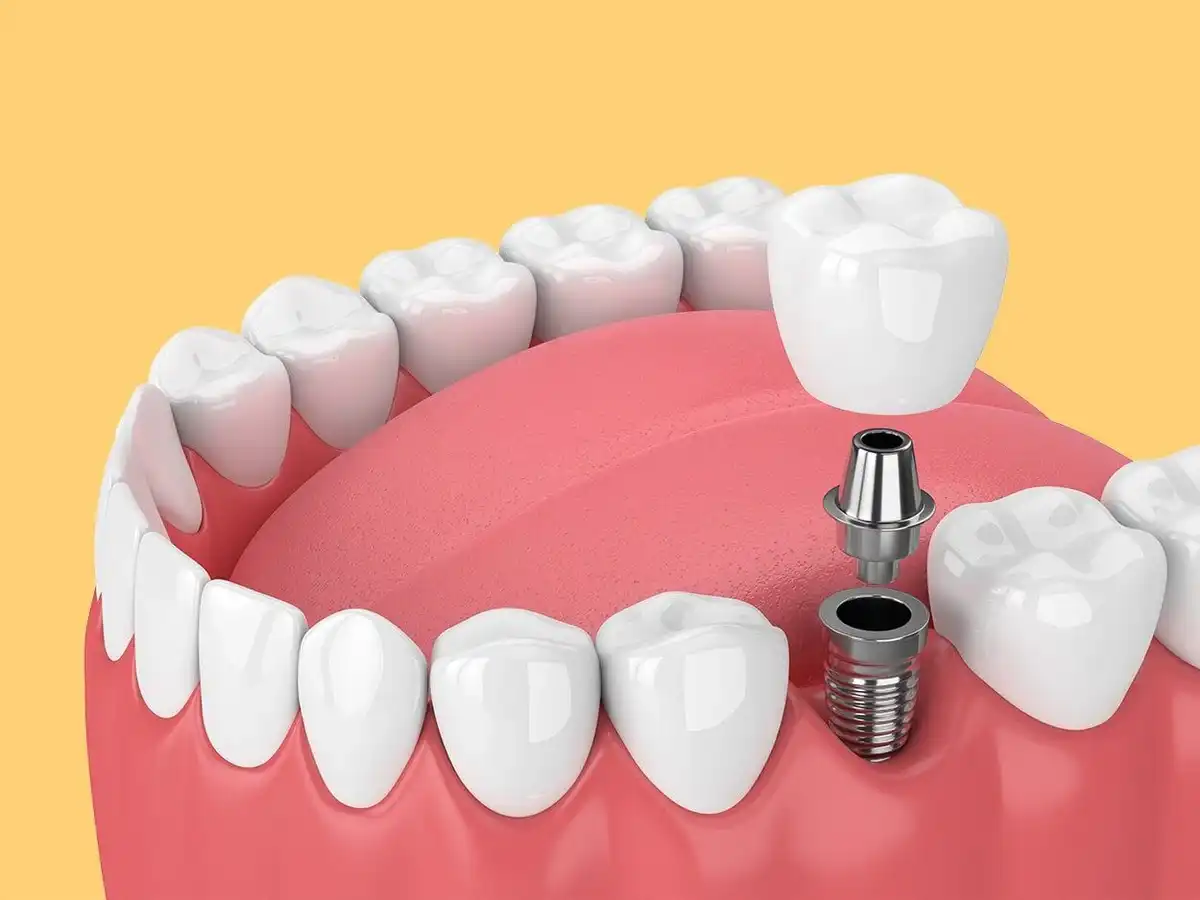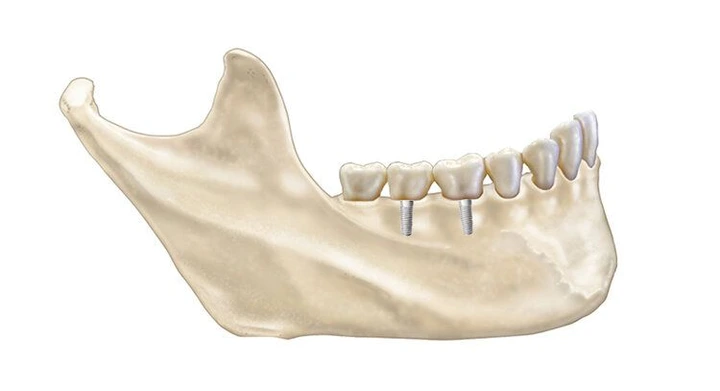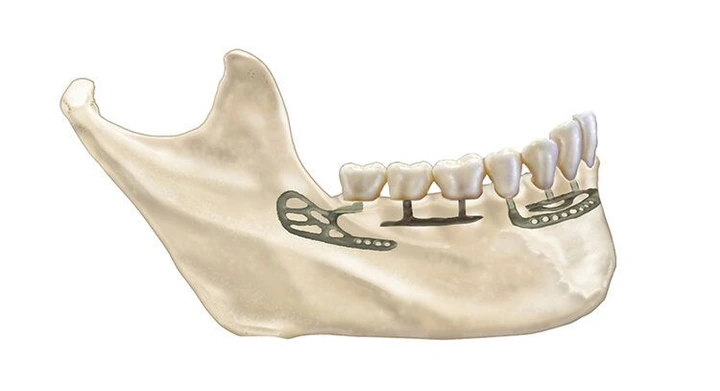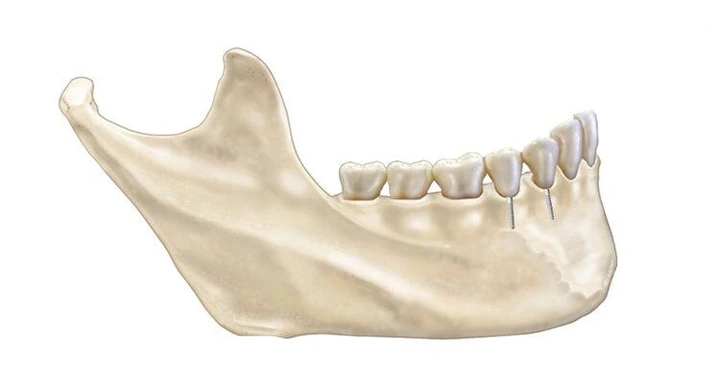How Much Are Dental Implants? Implant Costs & What to Expect

In this article, we may include products or services we think are useful for our readers. If you buy through links on this page, we may earn a small commission to help fund our mission to create more healthy smiles. Here’s our process.

Almost everybody knows that dental implants are the best way to replace your missing teeth. But how much dental implants cost can be a big deterrent to some people. How much are dental implants anyway? The short answer is, it depends. Some factors can reduce how much it costs to get implants, while others may raise your out-of-pocket expenses.
The cost of dental implants can vary depending on various factors such as the location, the number of implants needed, and any additional procedures required. On average, dental implants cost can range from $1,500 to $5,000 per implant, including the implant, abutment, and crown.
What Are Dental Implants?
Dental implants are basically artificial tooth roots. They’re made of nearly indestructible, hypoallergenic materials that are then placed into your jawbone, which fuses around the implant and holds it into place. An implant is about the same width and length as a natural tooth root, making it small enough to place between your other healthy teeth to replace the one that’s missing.
As great as all of these things sound, dental implants cost more than your average treatment. Fortunately, they also outperform them. So even if you’re asking “how much are dental implants,” you might actually wind up saving money by making a slightly larger investment in something that outlasts things like implant supported dentures, partials, or bridges.
Why You Would Need Dental Implants?
Here are just some of the different scenarios where you might need a dental implant:
You…
- Just had a tooth extraction (or multiple teeth)
- Suffered a severe injury or illness
- Need to remove teeth because of periodontal disease
- Don’t want to wear a partial or full denture
- Have dentures that rub, rock, or feel loose
- Are undergoing full mouth reconstruction
- Want to replace all of your teeth at one time
- Prefer a longer-lasting treatment
Dental implants can be used for any variety of missing tooth scenarios. Whether you only need to replace one tooth, a few in a row, or all of the teeth in your arch, implants are proven to make it possible. Plus, you don’t necessarily need as many implants as you have missing teeth. This factor alone can reduce dental implants cost because as few as four implants can support an entire full-arch restoration!
5 Types Of Dental Implants
The type of dental implant that you choose will directly impact the total cost of your treatment. While the average implant is a traditional titanium restoration, it can be helpful to be familiar with the different varieties out there.
1) Endosteal Implants

Most of today’s dental implant treatments is completed with titanium endosteal designs. These are the cylindrical or “screw”-like restorations that set in your bone similar to a tooth root.
2) Subperiosteal Implants

This type of implant system uses a bar that rests directly across the top of your jaw bone, to which different posts are attached (to support a full-arch or multiple tooth implant dental prosthesis. Installation is quite more complex and invasive than traditional implant designs.
3) Mini Dental Implants

A mini dental implant is about half the size of a traditional one. While they’re not capable of supporting as much weight as a full implant, mini versions fit well into places where the bone is narrow or there’s not a lot of space between teeth. They can be used for replacing small teeth (like the ones at the bottom front of your smile) or to help secure a removable overdenture. They’re also cheaper.
4) Zygomatic Dental Implants
Let’s say you don’t have enough bone in your mouth to anchor dental implants. What then? A zygomatic implant is designed to be much longer so that it can be angled up toward the cheekbone. Zygomatic implants may be paired with traditional implants to support full-arch prosthetics such as hybrid dentures or an All-on-4.
5) Ceramic Dental Implants
If you want a cosmetic alternative to silver titanium implants, ceramic is one option. These designs are made from tooth-colored materials, in case a portion of the implant ever becomes visible or there is a concern about a shadows behind thin gum tissues. Ceramic is less commonly used, so you might have to ask around before you find an implant dentist who offers them.
Cost Of Dental Implants
If anyone were to ask me, “How much are dental implants?”, it would be nearly impossible for me to give them an exact dollar figure. There are just too many variables that go into play. A dentist will need to sit down, look through their X-rays, and map out exactly what the patient needs. How much do dental implants? It depends on many factors but here are some average costs for popular dental implant types.
| Dental Implant Type | Average Cost | Avg. Cost with 1Dental |
|---|---|---|
| Single Dental Implant | $1,500 to $2,900 | $1,200 to $2,320 |
| Dental Implant Labor | $1,500 to $2,000 | $1,200 to $1,600 |
| Total Single Implant plus Labor | $3,000 to $4,900 | $2,400 to $3,920 |
All that being said, I can at least give you some averages when it comes to pricing, which again, differs from one area and dental practice to the next.
Dental implants can cost anywhere from $1,500 for a single dental implant to as high as $50,000 or more for full mouth reconstruction. On average, a single-tooth implant will usually run between $1,500-6,000. That’s including the crown or bridge that goes on top of it since implants are only the “root” portion (the implant by itself might only be $1,000-3,000, but that’s not the only cost you have to think about.)
When you start talking about replacing a few teeth at a time, you’re probably looking at a minimum of $5,000 or $6,000 up to $10,000 for a 3-4 tooth implant dental bridge.
The biggest variable is full-mouth dental implants. There are so many designs and options for full mouth implants, that you could pay as little as $3,500-$7,000 per arch or dental implant costs can reach upwards to over $30,000.
Does Dental Insurance Cover Dental Implants?
How much are dental implants if you have insurance coverage? Years ago, dental insurance plans hardly covered anything on implant treatments. Fortunately, that’s no longer the case.
On average, the typical dental insurance policy will cover about 50% of dental implants, as they’re a major treatment. Keep in mind that this does not include your:
- Deductible
- Co-pay
- Annual maximum allowable amount
The annual maximum is the dollar amount that your insurance policy will pay up to before it exhausts all of your benefits. For a lot of plans, that’s around $1,500 (the same about it’s been since the 1980s.) So, if you need a lot of dental implants, your coverage might only help pay for a couple of them.
Bone Grafting For Dental Implant Procedure
Bone grafting—also called augmentation—is a necessary dental procedure that dentists and dental specialists will use to help preserve teeth, repair areas of oral trauma, or prepare for dental implant placement.
Many people do not consider the cost of dental bone grafting when they are planning an upcoming procedure like dental implants or ridge augmentation with their dentures, which can significantly impact the total cost of their care. A bone graft can easily increase additional costs of dental implants by $1,000, to $3,000.
Cheapest Way To Get Dental Implants
What’s the most affordable dental implants? Here are your best options:
1) Treatment At A Dental School
You can get some hands-down amazing dentistry performed at a local dental school. Yes, these dental student doctors are still learning and perfecting their skills, but you won’t be tossed in with someone brand new. They’ll be supervised by an experienced team during the process. And chances are, getting dental implant surgery at a dental school might actually put you with the post-grad specialist students who are already licensed dentists! Those are the students who have already graduated from dental school but return for 2-3 more years to become a specialist in a particular field of oral health (such as periodontics or oral surgery.)
While dental schools might not take your dental insurance, their fees are extremely low and worthwhile if you are concerned about how much dental implants cost.
2) Payment Plans/Financing
It’s fairly common for implant patients to finance all or a portion of their reconstructive treatment, depending on whether they have insurance or money set aside. Today’s financing options typically include low-interest and 0% interest financing plans that can easily fit into your budget.
Most dentists work with 3rd party lenders such as CareCredit or similar financing programs. You can apply online or at the dental office you’ll usually get approval within just a few minutes. Depending on the type of plan you enroll in, you usually have several months to pay it off. Financing can also be combined with your insurance if you prefer to go that route.
One of the advantages of financing is that you can go ahead and benefit from having dental implants without having to wait months—or years—to save up the money in advance.
3) Dental Savings Plans
Dental discount plans are great for families or individuals that are looking to save 10% to 60% on the average cost of dental care. Financing options like discount dental plans can reduce your total costs and what you pay out of pocket significantly. Dental plans are nationwide with over 100,000 dentists in the program, see if you can save with a dentist near you.
4) Use Fewer Teeth Implants
Another easy way to save money on dental implants is by getting fewer of them. “How does that work,” you ask? Easy! Implants can be paired together to support multi-tooth restorations.
For example, your dentist could place two implants to attach a 3-4 tooth dental bridge on top of them. Or maybe you only get 4-6 implants for a hybrid or “All-on-4” implant prosthesis. In that scenario, you’re essentially replacing 14 teeth with only four implants total.
Alternative To Dental Implants
Alternatives to dental implants will be your traditional types of tooth replacement treatments. Such as:
2) Partials
Removable partial dentures only replace the teeth that are missing, instead of all of them at once. They snap into place around the remaining natural teeth you still have.
3) Dental Bridges
One of the things you’ll want to keep in mind is that dental implants tend to outlast all of these various options. So, the return on investment for dental implants cost could wind up saving you money and time over the grand scheme of things.
What To Expect From Dental Implants
Surprise! Getting dental implants can be fairly pain-free and straightforward in a lot of cases. For those complex situations where grafting, sinus lifts, or sedation are needed, the process does take a bit more time, planning, and adds to dental implants cost overall.
The most important thing to plan for is the time commitment. When an implant is installed into your bone, your body naturally needs at least 3-6 months for new bone to form and fuse itself onto the surface of your implant. This process is called “osseointegration” and it’s what makes implants so successful. Rushing osseointegration is like asking for failure, infection, dental damage, and lost money. Does that mean you’ll need to go without teeth for a few months? Usually not. Most dentists can fit their patients with a temporary prosthesis to wear while their implants integrate, then install the permanent restoration a few months later.
How Long Do Dental Implants Last?
While the implant itself can last for decades, there’s a chance that your restoration on top of it—such as your dental crowns or hybrid devices—will require occasional updates. Always be sure to see your dentist for regular checkups to have your implants monitored, that way they can intervene if an issue is starting to pop up that you could otherwise prevent.
How To Get A Price For Dental Implants
The only way to know exactly how much dental implants cost in your unique circumstances is to physically visit an implant dentist or oral surgeon for an exam and treatment plan. During your initial consultation, they’ll identify your specific needs, how many implants you require, if “extras” (such as grafting or sedation) need to be considered, and work out the math on your dental insurance benefits. How much are dental implants? You could spend anywhere from $1,000 to $50,000 or more, depending on where you live and what type of treatment you’re getting. It’s never a bad idea to get a second opinion either, just to know what your artificial teeth options are!

Make your inbox smile!
Subscribe






